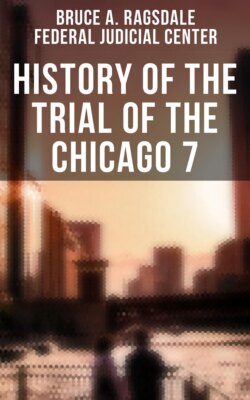Читать книгу History of the Trial of the Chicago 7 - Bruce A. Ragsdale - Страница 51
На сайте Литреса книга снята с продажи.
Bobby Seale (1936- )
ОглавлениеTable of Contents
Bobby Seale Courtesy of Bettman/Corbis.
Bobby Seale was in many ways the unlikeliest of the conspiracy defendants. Seale had met only one other defendant, Jerry Rubin, before their indictment, and some of the defendants did not meet him until they first appeared in the courtroom. Seale had been in Chicago briefly during convention week to give two speeches. Although his case was severed from the others well before the end of the trial, Seale’s confrontations with Judge Hoffman and Hoffman’s order to have Seale bound and gagged in the courtroom remain the most powerful examples of the breakdown of the judicial process during the conspiracy trial.
At the time of the Democratic National Convention, Seale lived in Oakland, California, and was chairman of the Black Panther Party. The Black Panthers had not participated in the planning for the Chicago demonstrations, but Seale made an overnight trip to deliver two speeches. Seale spoke to a rally in Lincoln Park and talked of the need for black men to arm themselves in protection against the police, whom he repeatedly referred to as the pigs. In the prosecution’s opening statement at the trial, Assistant U.S. Attorney Richard Schultz quoted Seale as saying “if they get in our way, we should kill some of those pigs" and talking about “barbecuing that pork."
The inclusion of Seale in the conspiracy indictment perplexed many people, including the other defendants, but it came at a time of numerous prosecutions of Black Panther Party members in different parts of the country and extensive FBI surveillance of the party members. Shortly before the start of the Chicago conspiracy trial, Seale and other members of the party were indicted in Connecticut on charges of conspiracy to murder a suspected police informant. Because of the indictment, Seale was the only defendant held in jail during the length of his time in the Chicago conspiracy trial.
Seale originally retained the Black Panthers’ lawyer Charles Garry as his attorney, and Garry appeared at the defendants’ arraignment on April 9. When the trial started in September, Garry was recovering from surgery and could not travel, but Judge Hoffman refused to delay the start of the trial. Seale repeatedly refused to allow William Kunstler to represent him, and in a series of increasingly hostile confrontations with the judge, Seale attempted to cross-examine witnesses and otherwise serve as his own counsel. Many of these confrontations ended with Seale’s litany of “liar, pig, fascist." On October 29, Judge Hoffman ordered that Seale be bound and gagged by the marshals before any court-room appearance. Newspapers across the country and television networks carried the courtroom drawings of the violently restrained Seale. Within a week, the judge relented, but when Seale again tried to represent himself, Judge Hoffman on November 5 ordered a mistrial in the prosecution of Seale. Judge Hoffman also convicted Seale on sixteen charges of contempt and sentenced him to four years in prison. The day before, a group of lawyers from across the country filed suit in the U.S. district court asking for an order stopping the trial until Seale was allowed to represent himself, but Judge Edwin Robson dismissed the suit on November 5.
The U.S. Court of Appeals for the Seventh Circuit dismissed four of the contempt convictions of Seale and remanded the other twelve for retrial before another judge in the district court. The government declined to prosecute the contempt charges. The court of appeals did not rule on Seale’s right to a delay in the trial or the right to represent himself, but it found that the trial judge was obligated to investigate Seale’s claims that he was not being represented by an attorney of his choice. If such an inquiry had confirmed Seale’s account of meetings with his lawyer and found that Seale was “free from ulterior motivation," Judge Hoffman would have been in error to force Seale to rely on Kunstler as his lawyer.
Seale faced trial on the murder conspiracy charges in New Haven, Connecticut, where thousands of protestors, including Abbie Hoffman, criticized the alleged harassment of the Black Panther Party. The jury deadlocked on the charges against Seale, and he never faced a retrial. In 1973, Seale was a candidate for mayor of Oakland, California, but lost to the incumbent in a runoff. Seale later taught political science and served as an assistant to the dean at Temple University in Philadelphia. In 1988, he published a cookbook, Barbecue’n With Bobby.
